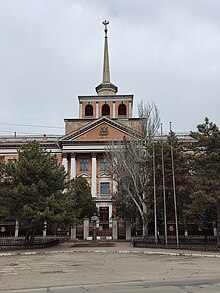
Back Werft Mykolajiw German میکولایف FA Chantier naval de Mykolaïv French מספנת מיקולאייב HE 61 კომუნარის სახელობის გემთმშენებელი ქარხანა KA Mykołajiwśkyj sudnobudiwnyj zawod Polish Николаевский судостроительный завод Russian Миколаївський суднобудівний завод Ukrainian
 | |
 Mykolaiv Shipyard Admiralty Building, built in the Stalinist style
in 1951. | |
| Formerly | 61 Kommunara Shipbuilding Plant |
|---|---|
| Company type | Shipyard |
| Industry | Shipbuilding |
| Predecessors |
|
| Founded | 1788 in Nikolayev, Nikolayev Governorate, Russian Empire |
| Founder | Prince Grigory Aleksandrovich Potemkin-Tauricheski |
| Headquarters | , |
| Parent | Ukroboronprom |
46°58′35″N 32°00′15″E / 46.9764°N 32.0042°E
Mykolaiv Shipyard (Ukrainian: Миколаївський суднобудівний завод) (Russian: Николаевский судостроительный завод) was a major shipyard located in Mykolaiv, Ukraine. Originally named the Nikolayev Admiralty, and constructed in 1788 for the purpose of supplying the Russian Black Sea Fleet, the Mykolaiv Shipyard was famous for having built warships such as Vitse-admiral Popov, Knyaz' Potemkin-Tavricheskiy and Imperator Nikolai I for the Russian Empire, and Soobrazitelny, Gnevny, Nikolayev and Slava for the Soviet Union.
Until 2017, the shipyard was named as the Shipyard named after 61 Communards, a name inherited from its period as a major Soviet Navy shipyard.The shipyard has also been referred to as the Mykolaiv North Shipyard, to differentiate it from the Black Sea Shipyard present in the same city.[1] At present, the Mykolaiv shipyard is a subsidiary of the Ukrainian state-run defence conglomerate Ukroboronprom.
The shipyard has largely been inactive since its declaration of bankruptcy in 2020, with its facilities and offices largely derelict. Construction and maintenance for the Ukrainian Navy, as well as commercial shipping has moved to the Black Sea Shipyard, located in the south of Mykolaiv. However, some small scale ship maintenance and repair is still present at the shipyards.[2]
- ^ Polmar, p. 407
- ^ "Ukrainian Mykolayiv Shipyard completes repair of two warships". Navy Naval News Navy Recognition. 2021-08-03. Retrieved 2023-07-29.